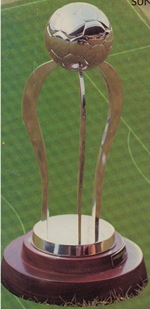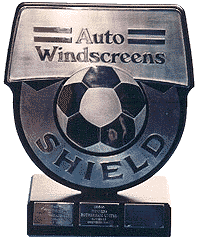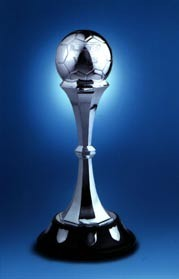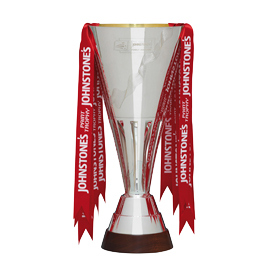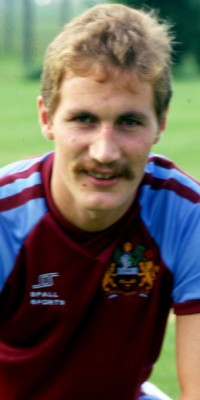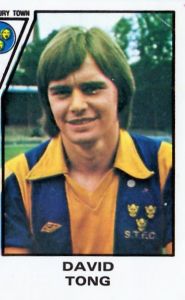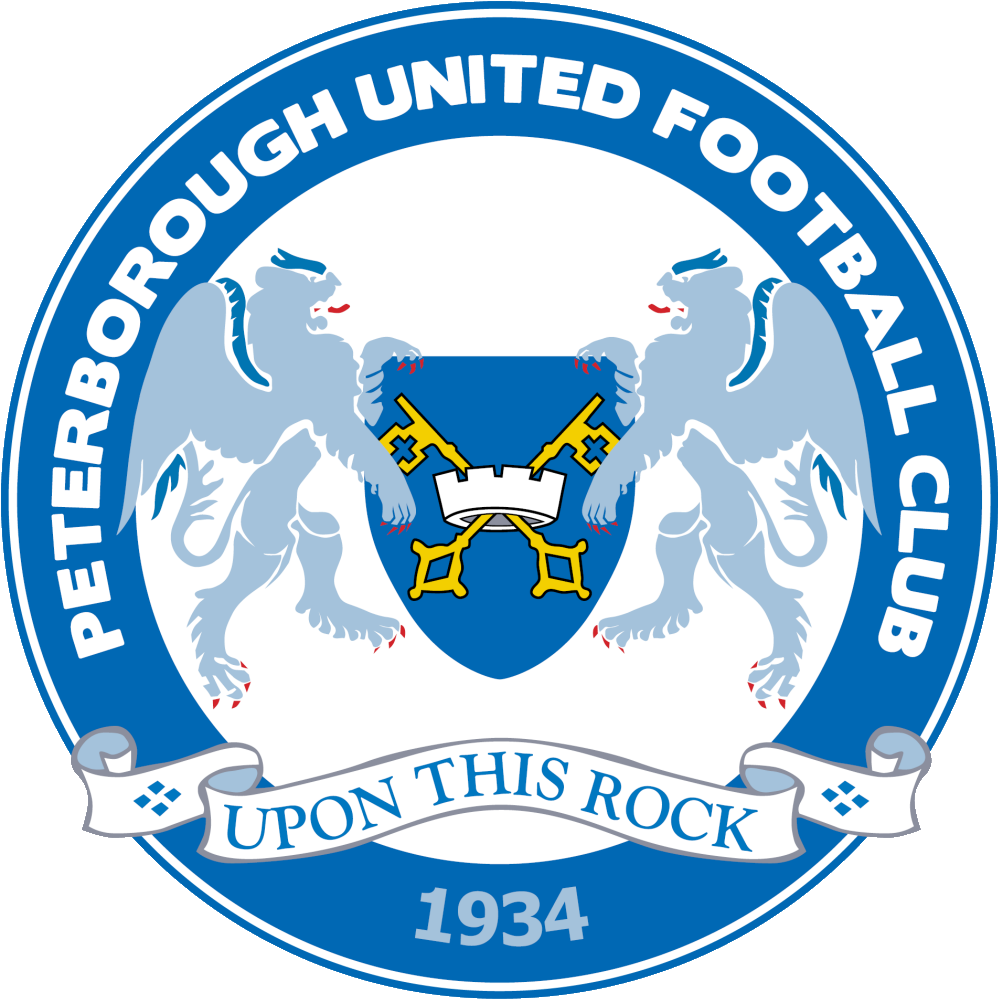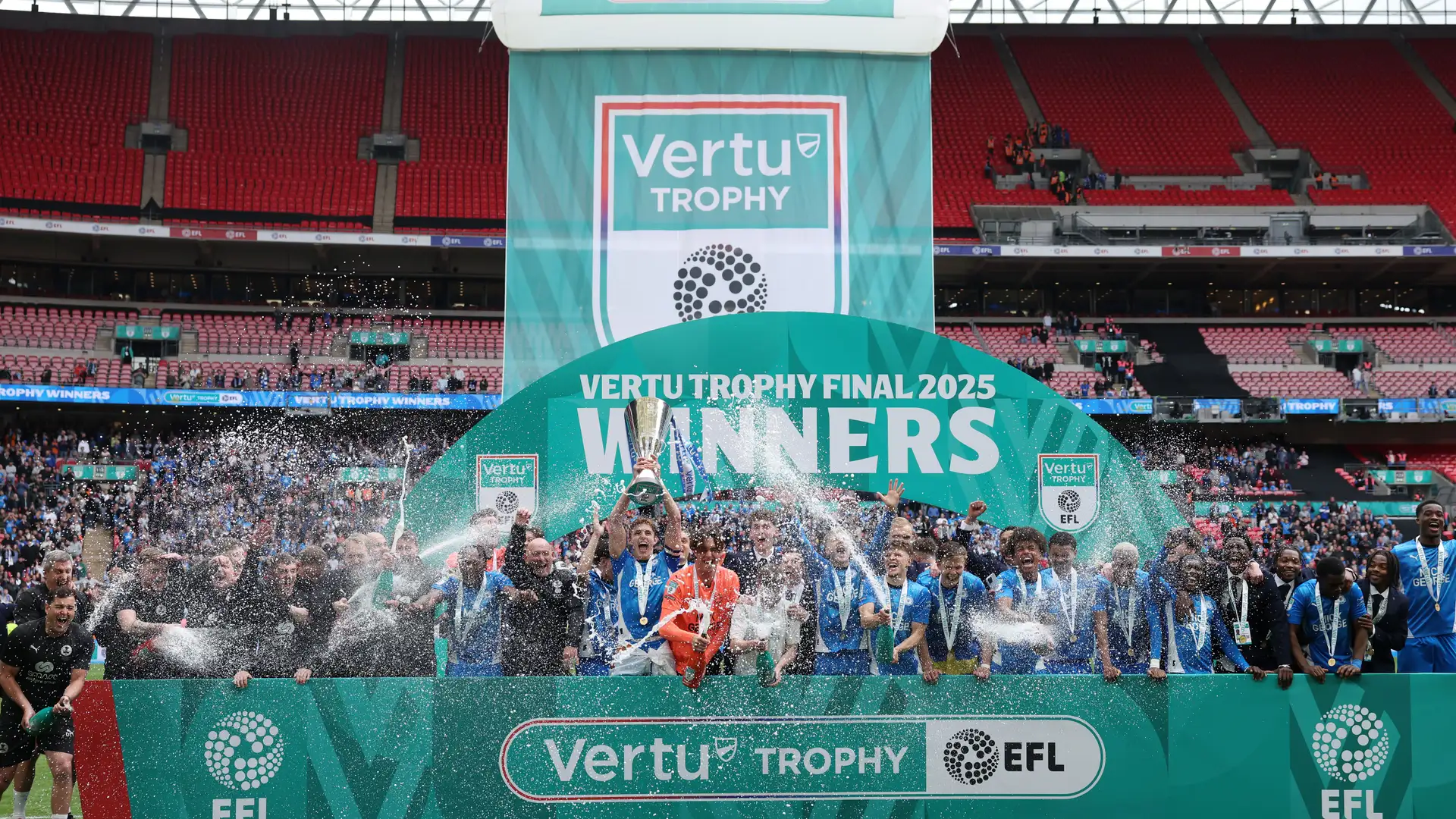THE EFL TROPHY
Six of the Football League trophies used in the competition. (L-R: the Freight Rover / Sherpa Vans trophy, Leyland DAF Cup, Autoglass trophy, Auto Windscreens' Shield, LDV Vans trophy, Johnstone's Paint trophy)
The Football League Trophy, also known as the Johnstone's Paint Trophy is an annual English association football knock-out competition open to the 48 clubs in Football League One and Football League Two, the bottom two divisions in the four (mainly) professional top divisions of English league football.
The competition began in the 1983–84 season as the Associate Members' Cup but, from 1992, it has been named the Football League Trophy, after the lower-division clubs became full members of the Football League. The competition replaced the short-lived Football League Group Cup, a competition which was only played in 1981-82 and 1982-83 (although confusingly, in the second year it was also called the Football League Trophy). The competition has been associated with a title sponsor since its second edition.
The Football League Group Cup The Football League Group Cup first took place prior to and during the 1981–82 season. For Football League clubs it was seen as a replacement for the Anglo-Scottish Cup, which had been discontinued due to the withdrawal of Scottish League clubs. For the 1982–83 season it was renamed as the Football League Trophy. It is considered as the forerunner of the Associate Members Cup (which later became renamed as the Football League Trophy, and had various sponsored names), which commenced from the 1983–84 season, although some sources regard the Football League Group Cup as the same as the later League Trophy tournaments.
Format In each season there were 32 participants, split into eight regional groups of four teams each, with three round-robin games played by each side. The eight group winners qualified for the quarter finals, and the knockout stages were played as a single leg, with the game going to extra time and penalties if necessary. The final was played on the home ground of one of the two teams.
Participants The following 32 sides played in the competition, and these are sub-divided according to the League division they played in that season.
Football League Division One: Notts County Football League Division Two: Bolton Wanderers, Grimsby Town, Norwich City, Orient, Rotherham United, Shrewsbury Town, Watford Football League Division Three: Burnley, Carlisle United, Chester, Chesterfield, Doncaster Rovers, Gillingham, Lincoln City, Newport County, Oxford United, Plymouth Argyle, Preston North End, Reading, Southend United, Wimbledon Football League Division Four: Aldershot, Blackpool, Bournemouth, Bradford City, Bury, Hartlepool United, Hull City, Peterborough United, Sheffield United, Torquay United
The tournament was won by Grimsby Town, who defeated Wimbledon 3–2 in the final at Blundell Park on Tuesday 6 April 1982.
The following 32 sides played in the competition, and these are sub-divided according to the League division they played in that season.
Football League Division One: Norwich City, Watford Football League Division Two: Crystal Palace, Grimsby Town, Shrewsbury Town Football League Division Three: Bournemouth, Bradford City, Brentford, Chesterfield, Exeter City, Lincoln City, Millwall, Newport County, Orient, Oxford United, Reading, Sheffield United, Southend United Football League Division Four: Aldershot, Bristol City, Chester, Colchester United, Halifax Town, Hartlepool United, Hull City, Mansfield Town, Northampton Town, Peterborough United, Scunthorpe United, Torquay United, Tranmere Rovers, Wimbledon
The tournament was won by Millwall, who defeated Lincoln City 3–2 in the final at Sincil Bank on Wednesday 20 April 1983.
Present format 64 teams enter the 1st round; all 48 teams from levels 3 and 4 of the football pyramid (League One and League Two), along with 16 category-1 Premier League and and Championship academy / under-21 sides. 16 regional groups of 4 teams split evenly 8 northern and 8 southern groups. Each of the groups contains one academy team. The top two from each group progress to the knockout stages; the first two rounds of which remain regionalised before becoming an open draw from the quarter-finals onwards.
During the group phase, if the scores are level at the end of the match, then penalties are taken immediately without recourse to extra time. The winning team is awarded 2 points and the losing team 1 point. During the knock-out phase, up to but not including the final, if the scores are level at the end of the match the winner is decided by penalties. In the final, if the scores are equal after 90 minutes an extra 30 minutes are played and if still equal the winner is then decided by penalties.
Previous formats from 1983-84 season In the first year of the tournament the 48 eligible Third and Fourth Division clubs were split into North and South sections of 24 teams each. The first round had 12 knockout ties in each section, and the second had six. The two losers with the 'narrowest' defeat were reprieved and joined the six other clubs in the regional quarter finals.
A major change was introduced for the 1985–86 tournament, with 8 three-team groups being set up in each of the two sections. Teams played one home and one away game and the group winners proceeded to the regional knockout stages. This format was tweaked the following season, with two teams qualifying from each group, resulting in an additional 'round of 16' knockout stage in each section.
For a number of seasons in the early to mid-1990s the competition ran with only seven three-team groups with two teams in each section getting a bye to the knockout stages. This was necessary due to League reorganisation and the demise of Aldershot and Maidstone United, which resulted in there being fewer than 48 teams in the 3rd and 4th levels.
The group phase was abolished for the 1996–97 tournament, with 8 teams in each section getting a bye to the second round, where they were joined by the 8 winners of the first round ties.
For the 2000–01 edition, 8 Football Conference sides also played in the tournament, resulting in 12 ties in each of the north/south sections in the 1st round, with only four teams in each section gaining a bye into the second round. The number of Conference entrants was increased to 12 starting in 2002–03, resulting in 14 1st round ties, and two teams in each regional section gaining a bye straight to the second round.
From the 2006–07 tournament Conference teams no longer participated, and the format reverted to 8 1st round teams in each section, with 8 sides gaining byes to the 2nd round.
Participants The competition has always been contested by all teams at Levels Three and Four of the English football league system. However, between 2000-01 and 2005-06 the event was also open to a certain number of Football Conference sides, and these are listed by season below:
2000–01: Chester City, Doncaster Rovers, Dover Athletic, Hereford United, Morecambe, Rushden & Diamonds, Scarborough, Yeovil Town
2001–02: Barnet, Dagenham & Redbridge, Doncaster Rovers, Leigh RMI, Scarborough, Southport, Stevenage Borough, Yeovil Town
2002–03: Chester City, Dagenham & Redbridge, Doncaster Rovers, Halifax Town, Hereford United, Leigh RMI, Morecambe, Scarborough, Southport, Stevenage Borough, Woking, Yeovil Town
2003–04: Barnet, Chester City, Dagenham & Redbridge, Exeter City, Forest Green Rovers, Halifax Town, Hereford United, Morecambe, Scarborough, Shewsbury Town, Stevenage Borough, Telford United
2004–05: Accrington Stanley, Aldershot Town, Barnet, Carlisle United, Dagenham & Redbridge, Exeter City, Hereford United, Morecambe, Scarborough, Stevenage Borough, Woking, York City
2005–06: Accrington Stanley, Aldershot Town, Cambridge United, Crawley Town, Dagenham & Redbridge, Exeter City, Halifax Town, Hereford United, Kidderminster Harriers, Morecambe, Stevenage Borough, Woking
Finals Venue The League Trophy final is held at the 90,000-seat Wembley Stadium in London, the English national football stadium. The first final in 1984 was to have been played at Wembley, but due to damage to the pitch caused during the Horse of the Year show it was moved to Hull. From 2001 to 2007 when the 1923-built Wembley was being rebuilt, the Football League Trophy finals were played at the Millennium Stadium, Cardiff.
The competition has been sponsored since the 1979 season as follows:
Attendances The record attendance for the final is 85,021, for the 2019 final between Portsmouth and Sunderland at Wembley.
The highest attendance for any game outside of the final came on 5 February 2013, when Coventry City lost to Crewe Alexandra 3–0 at the Ricoh Arena in Coventry, in front of a crowd of 31,054.
The lowest attendance came on 7 November 2018, when Burton Albion lost to Middlesbrough under-21 team at the Pirelli Stadium in Burton-on-Trent, in front of a crowd of 202.
Other records Biggest home victory: 10-1, Southend United v Aldershot, Leyland DAF preliminary round South Group 6 at Roots Hall, Southend-on-Sea on 6th November 1990.
Biggest away victory: 0-8, Stevenage v Charlton Athletic, Checkatrade Trophy 1st round South Group G at The Lamex Stadium, Stevenage on 9th October 2018.
Biggest aggregate score in one game: 7-5, Gillingham v Reading under-21, Checkatrade Trophy 1st round South Group B at Priestfield, Gillingham on 7th November 2017.
Most goals scored overall: 26, Steve Bull for Wolverhampton Wanderers.
First goalscorers:
Current holders:
PETERBOROUGH UNITED
Here's a full list of the Football League Trophy winners:
For details of the Football League Trophy final results click here. For details of each season's results select the links above. For details of Football League Trophy area final appearances click here. For details of each individual club's results, click here. |

